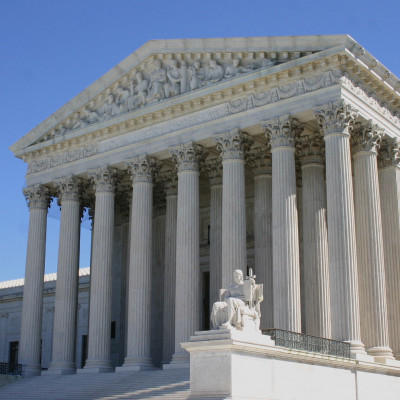March 31, 2022
March 2022 at Policy Integrity
- A Win for Consumers and Climate
- Seeking: Senior Attorney with Appellate Experience
- New Climate Risk Disclosure Rule Can Protect Investors, Grandparents
- What EPA’s New Truck Rule Means for Environmental Justice
- In the News
- Shaping New York’s Grid Planning Process
- More From This Month
-

A Win for Consumers and Climate
The National Highway Traffic Safety Administration (NHTSA) recently released its final rule updating the Corporate Average Fuel Economy (CAFE) standards for cars and light trucks. As part of our ongoing engagement on federal transportation policy, we filed comments on the proposed rule, which were cited more than 30 times in the final rule. NHTSA also repealed a Trump-era rule that would have allowed companies that violate CAFE rules to face reduced civil penalties. The agency cited our comments and administrative advocacy in this repeal.
"By finalizing the largest increases to fuel economy standards in the CAFE program’s history, NHTSA is enabling consumers to save money at the pump and furthering our energy independence at this crucial time,” said attorney Meredith Hankins in a recent statement quoted in Inside EPA.
-

Seeking: Senior Attorney with Appellate Experience
We are seeking an experienced appellate litigator to support our work on regulatory policy—including environmental and energy policy, as well as public health and consumer protection. The senior attorney will supervise attorneys and legal fellows and work with economists and policy analysts to: draft amicus briefs in major cases before the Supreme Court and other courts; file regulatory comments and other formal submissions to federal and state agencies; and advise other advocacy organizations on how to navigate regulatory impact analyses; among other tasks. The full job description is available here. Applications will be accepted until April 15 and will be reviewed on a rolling basis.
-

New Climate Risk Disclosure Rule Can Protect Investors, Grandparents
Climate impacts could cost the global economy trillions of dollars annually by 2100. Yet despite their serious implications, climate-related financial risks are under-disclosed by companies. The Securities and Exchange Commission’s (SEC) plan to expand and standardize how public companies disclose climate change-related business risks is therefore a much-needed step in the right direction. “The commission no longer has the luxury of ignoring climate change and must protect investors by demanding the same transparency on climate risk as other financial risks,” said regulatory policy director Jack Lienke.
In light of a separate, recently proposed rule allowing retirement plan managers to consider climate risks in their decisions, SEC’s new rule can help place American retirees on firmer financial footing. Legal fellow Alex Song explains the importance of this change in retirement fund management here.
-

What EPA’s New Truck Rule Means for Environmental Justice
The Environmental Protection Agency’s new rule regulating pollution from heavy-duty trucks marked an environmental justice milestone: the rule’s regulatory impact analysis is the first to evaluate the distributional consequences of its proposal and show that its most stringent proposed alternative would provide the greatest benefits to communities of color with the highest existing pollution burdens, explained attorney Meredith Hankins. Analyzing the distributional impacts of proposed rules is critically important to understand whether policies that aim to address equity concerns actually improve environmental justice outcomes. Pollution from the logistics industry disproportionately affects low-income communities of color, and this rule could begin to address this inequity. To learn more about this rule and the other vehicle rules recently released by the Biden administration, see Hankins’s explainer blog post.
-

In the News
This month has been packed with climate policy news, and our lawyers and policy analysts have been busy breaking it down.
The Federal Energy Regulatory Commission pressed pause on a new policy laying out a framework for considering climate impacts when evaluating major natural gas projects, but the Commission will still have to consider these impacts under recent court orders, attorney Sarah Ladin told E&E News.
The Supreme Court recently heard West Virginia v. EPA, a case seeking to limit the scope of the Environmental Protection Agency’s ability to regulate greenhouse gases. Director Richard Revesz, regulatory policy director Jack Lienke, and Legal Fellow Rachel Rothschild appeared on the Drilled, Volts, and Strict Scrutiny podcasts, respectively, to explain why the case should be dismissed and what implications it may have for EPA’s climate authority and agencies’ rulemaking leeway more broadly. Revesz also spoke to the New York Times about the case, saying it posed “a serious threat to regulations.”
At a time of setbacks to climate action at the federal level, senior policy analyst Iliana Paul joined an episode of Pricing Nature to discuss how states are taking climate action through state and regional cap-and-trade programs.
-

Shaping New York’s Grid Planning Process
To comply with New York's Climate Leadership and Community Protection Act, the state’s electric utilities have developed a coordinated grid planning process and an updated approach to analyzing the benefits and costs of infrastructure investments. However, these tools do not properly consider global and local emissions impacts, limiting their ability to align utilities' planning and investment decisions with state law. Energy policy director Burçin Ünel and senior attorney Justin Gundlach filed comments urging the Commission to recognize and address this limitation.
-
More From This Month
We submitted comments to:
- BLM on its environmental analysis for the Willow Master Development Plan, which would authorize 30 years of oil drilling in Alaska. Our joint comments focusing on numerous inadequacies in the agency’s climate impact analysis were signed by partner groups including Earthjustice and the Sierra Club.
- DOE on an application for authorization to export liquefied natural gas.
- The Consumer Product Safety Commission on its proposed rule for custom window coverings.
Events:
- Director Richard Revesz moderated a panel of former Office of Information and Regulatory Affairs administrators—Sally Katzen, Susan Dudley, Boris Bergstein, and Paul Ray—at the annual conference of the Society of Benefit-Cost Analysis.
- Revesz also moderated a panel on environmental justice hosted by NYU Law’s Latinx Law Students Association. The panel featured prominent environmental justice advocates from EPA (Jeffrey M. Prieto, Lisa F. Garcia), environmental groups (Mark Magaña), academia (Gerald Torres), and the private sector (Ignacia Moreno).
- Together with the Environmental Defense Fund, we co-hosted a webinar on distributed energy resources’ network impacts. The recording is available here.
In other news, founding director and senior advisor Michael Livermore will be joining the Environmental Defense Fund’s Economics Advisory Council.
